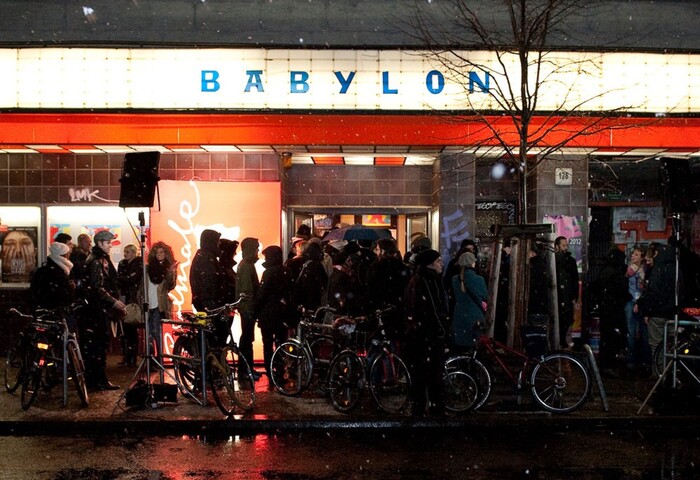The Münchner Kammerspiele started the new season with “Effingers” based on the novel by Gabriele Tergit.
Jan Bosse staged the world premiere.
Our premiere review:
It's a terribly nice family.
She tells us about a Germany that is far and yet close.
And their fate tells of how we became what we are - and what we have lost.
The Münchner Kammerspiele started the new season on Saturday with the “Effingers”;
the premiere was applauded violently and warmly.
Gabriele Tergit's “Effingers” first appeared in 1951
The author Gabriele Tergit (1894-1982), whose real name was Elise Reifenberg, unfolds the story of the Effingers in her novel. The book, begun in the early 1930s and partly written while fleeing the Nazis, appeared in 1951 - and was quickly forgotten, apart from a few friendly reviews. The nearly 900-page tome only came out two years ago, and now there was - finally - the enthusiastic response that “Effingers” deserves (we reported).
Tergit describes the rise of the brothers Karl and Paul Effinger, who moved from Kragsheim in southern Germany to Berlin at the end of the 19th century.
Here both succeed as manufacturers and marry into the highly respected Oppner-Goldschmidt banking family.
Their Jewishness brought the Effingers, Oppners and Goldschmidts deadly danger from 1933 onwards, but their beliefs were also - at least subliminally - an issue in the German Empire and in the Weimar Republic.
"Effingers" are more than the Jewish "Buddenbrooks"
It does not go far enough to read “Effingers” as Jewish “Buddenbrooks”. In her concise, unexcited, elegant style, Tergit unfolds an enormous panorama in which industrialization, emancipation, gender and family images, the social question, patriotism and much more are instructively and entertainingly negotiated. With the interweaving of world (economic) data, the writer also gives her story concrete evidence of the times.
A broad field of which every stage adaptation can inevitably only show a few square meters.
The version created by the director Jan Bosse, who was already working on Maximilianstrasse under Dieter Dorn in the late 1990s, and Viola Hasselberg, the chief dramaturge of the Kammerspiele, does not come close to the complexity, the depth and the heart of the original.
A theatrical text cannot do that at all.
Nevertheless, the two managed to distill a coherent, also entertaining essence of the novel.
“Effingers” was the first premiere of the season at the Schauspielhaus
Jan Bosse and his twelve-person, extremely playful ensemble bring this to the Schauspielhaus as a mixture of family constellation, therapy session and anecdotal storm, as it is part of visiting relatives. Looking back, looking at things from today to the past, some things seem absurd, twisted and curious, so the first half in particular is characterized by a lot of comedy. The dynamic slapstick staging sometimes forgets that questions of social position, public reputation and befitting marriage policy were very often very serious during the times of the empire.
Nevertheless, bosses manage to introduce the characters of Mischpoke, their worries, needs, wishes and dreams.
In the second half, the director gives the quiet, thoughtful moments more space, for example when Julia Graefner reports in a heartfelt monologue as Klara Effinger about how her son Fritz died of the Spanish flu.
The Kammerspiele ensemble carries out the evening
The seven actresses and five actors carry these three and a half hours (a break) through their often well-coordinated cooperation, especially in silent play. “Effingers” thrives on the strong performance of the ensemble, where there is a reunion with some good friends of the house. With André Jung, for example, who focuses more on Waldemar Goldschmidt than Tergit does in the book: as a level-headed, life-wise and (until the end!) Optimistic observer, advisor, commentator on family and times. Edmund Telgenkämper is - a pleasure! - after five years in Zurich back in the ensemble of the city stage. It shows the Patriarch Emmanuel Oppner as a handsome man, an impressive banker - and a staunch patriot. His sister Eugenie plays Katharina Marie Schubert, who was at the house until 2008,as an emancipated woman, whose self-determination was born out of necessity - and who would probably never dream of calling himself emancipated.
Nevertheless, she is above all a role model for the next generation, who are politically, privately and professionally looking for their way beyond the paths worn out by the ancestors. Until 1933, it was not just the stage set by Stéphane Laimé, a transparent wall that was both a blackboard and a projection surface, crashing onto the floor.








